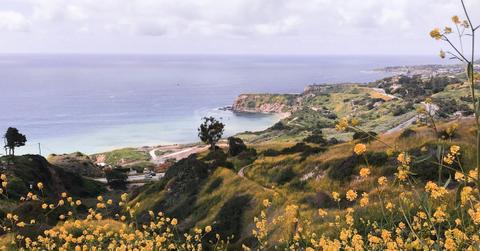Radar Imaging Shows a Portion of Southern California Is Slipping Into the Ocean
It's a problem six decades in the making.
Updated Feb. 7 2025, 4:11 p.m. ET

Residents of a picturesque coastline located along Rancho Palos Verdes in California are caught in the middle of a slow-moving landslide. According to radar images, the town was slipping into the ocean at a rate of 4 inches per week at one point.
The news isn't surprising to those living in the area since the residential region has been experiencing the slow-motion catastrophe for decades.
Updated data from NASA may indicate that the rate of movement is picking up, putting some 100 homes in jeopardy of falling into the waters of the Pacific Ocean.
You can learn more about the Rancho Palos Verdes landslide below, including what experts say is behind the area's destruction.

Rancho Palos Verdes in California is slowly slipping into the ocean.
NASA has used data from four different flyovers using Uninhabited Aerial Vehicle Synthetic Aperture Radar (UAVSAR) to put together a map of the region of Rancho Palos Verdes. After reviewing the map, NASA researchers were able to determine that the peninsula located on the coast of the Pacific Ocean has been slipping into the water at a faster rate than previously, according to Newsweek.
The most alarming period occurred between Sept. 18, 2024, and Oct. 17, 2024, which is when it was moving at an average of 4 inches per week. This was around the same time that Newsweek says officials had told residents that more than 100 homes in the neighborhood were at risk of falling into the Pacific Ocean.
The emergency has been ongoing in the region, and a state of emergency was declared by California Governor Gavin Newsom as a result.
The Federal Emergency Management Agency (FEMA) even partnered with California officials to offer homeowners $42 million to sell their homes and evacuate. Newsweek notes that the homeowners were only offered a buyout that accounted for 75% of their home's value. The city received just 85 applications, which will likely result in only 23 buyout offers.
The news isn't all bad for Rancho Palos Verdes. According to Newsweek, the rate of the landslide has slowed since NASA's initial alarming figures were released. While it doesn't mean that conditions are improving, it does mean that they aren't deteriorating quite as quickly as they were just months before.
What's causing the Rancho Palos Verdes landslide?
A landslide is caused when areas prone to gravitational pull (think slopes or hillsides) are covered in a material that is not strong enough to resist that pull. Things like snowmelt, rain, erosion, earthquakes, and human disturbances can all contribute to a material's lack of resistance on a slope, making it more likely to slide, according to the U.S. Geological Survey.
A combination of heavy rainfall in 2023 and 2024 and other extreme weather patterns seem to be behind these landslides, though.
According to CNN, an atmospheric river was largely to blame for that first part. The second was attributed to the fact that California is especially vulnerable to the impacts of climate change due to the extreme shifts between the wet winters and the dry summers.
With Climate change causing unprecedented extremes in the weather, the state is in a precarious position of either being flooded by surprise rains in the dry season or by making the region vulnerable to droughts and wildfires in the wet season.
Unfortunately, with the world's continued reliance on fossil fuels, situations like the one in Rancho Palos Verdes aren't likely to improve on their own.